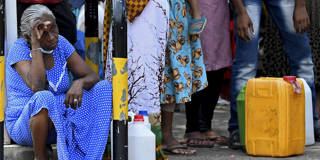Although there is a gender pension gap in both rich and poor countries, the problem is particularly acute in the developing world. Sri Lanka’s recent domestic-debt restructuring, which targeted pension funds, has illustrated how the mounting sovereign-debt crisis in developing countries could push even more older women into poverty.
COLOMBO – The World Bank’s Women, Business, and the Law Index has documented a persistent gender pension gap in rich and poor countries alike. This is partly because of gender-based legal disparities, such as a lower mandatory retirement age for women and the lack of pension credit for periods of childcare. Because women have shorter working lives, earn less, and have higher life expectancy than men, they often receive lower benefits, which must last longer.

COLOMBO – The World Bank’s Women, Business, and the Law Index has documented a persistent gender pension gap in rich and poor countries alike. This is partly because of gender-based legal disparities, such as a lower mandatory retirement age for women and the lack of pension credit for periods of childcare. Because women have shorter working lives, earn less, and have higher life expectancy than men, they often receive lower benefits, which must last longer.